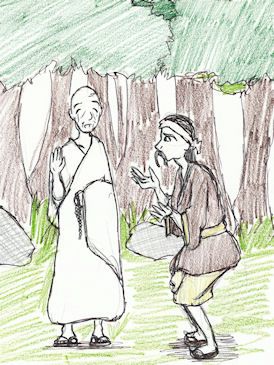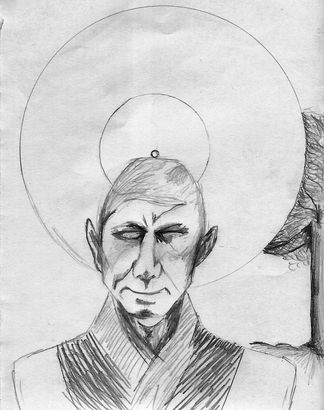
He hurried to see if he could get Ēnán to introduce him to the Buddha before the Buddha attained nirvana.
Drawing by Lan-Anh Pham, Sixth College (UCSD), Class of 2011, by permission
As the time drew near for the Buddha to reach nirvana, Ēnán urged him not to do so in the small and wild region of Jūshī-nuó, but to return to a bigger place like Wángshè or Shèwèi or Píshèlí. There would be rich people in such places who could arrange things well.
But the Buddha reprimanded him, and told him that Jūshī-nuó was not to be despised, for it was once a flourishing capital from which the holy king Zhuǎnlǔn (Zhuǎnlún shèngwáng 转轮圣王) had once ruled a great realm, just as the Buddha had appeared so that the realm of all the world could be saved. He told Ēnán to go and announce to the king and the people of Jūshī-nuó that this evening, in this wood, the Lord of the World would attain nirvana. Before this, they could come and see the one who had come to save them (Rúlái 如来).
So Ēnán, with heavy heart, took some of the bǐqiū and went to see King Mòluó.

When the king and people in Jūshī-nuó heard what Ēnán told them, they were extremely sad, and they hurried to the grove of suōluó trees to see the Buddha for one last time and to honor him and to express their concern.
There was a wandering Brahman named Xūbá-tuóluó 须跋陀罗 who was staying in Jūshī-nuó at the time. Xūbá-tuóluó was said to be 120 years old, and he was widely referred to as a wàidào 外道, which means a heretic, on account of the odd opinions he had about everything and the curious questions he asked that nobody could answer. When Xūbá-tuóluó heard the news about the Buddha, he hurried to see if he could get Ēnán to introduce him to the Buddha before the Buddha attained nirvana, for only the Buddha was likely to be able to clarify some questions that were troubling him.
Arriving at the wood, Xūbá-tuóluó asked Ēnán over and over to let him talk with the Buddha and ask him the unanswerable questions. And over and over Ēnán declined on the grounds that the Buddha was too sick to deal with such issues at this time. But Xūbá-tuóluó kept asking, and at length their altercation grew so loud that the Buddha overheard them, and wondered what all the shouting was about, for he retained his childhood curiosity throughout his life, and shouting in the presence of a dying man about to attain nirvana could only be interesting.
When he knew why Xūbá-tuóluó had come, he ordered Ēnán to bring the man before him.

Xūbá-tuóluó approached and asked his questions, more reverently than Ēnán expected he would, and the Buddha answered him with surprising clarity and strength. Indeed, the Buddha and so impressed him and so clarified his mind, that immediately Xūbá-tuóluó asked permission to join the Buddha's followers. The Buddha granted his wish, and told Ēnán to shave Xūbá-tuóluó's head like the others. And thus Xūbá-tuóluó became the Buddha's very last bǐqiū, just as Ēruò Jiāo-chénrú 阿若憍陈如 in the Deer Park had become his very first.
Then the Buddha asked all of them if they had any remaining doubts about his teachings, about the Buddha himself, or the other buddhas past or future, or about the law or about the priesthood, in short, about the Three Treasures (sānbǎo 三宝). And finally he gave them his last instruction: "Nothing is constant, you will be separated from all things. This is unavoidable."
Then he closed his eyes, and he left the cycle of birth and death at the age of 80 at the suōluó grove outside the town of Jūshī-nuó under the reign of King Mòluó in the last hour of the 15th day of the 6th month.
But his teachings will remain forever, enabling billions of people to transcend the cycle of birth and death and attain nirvana.